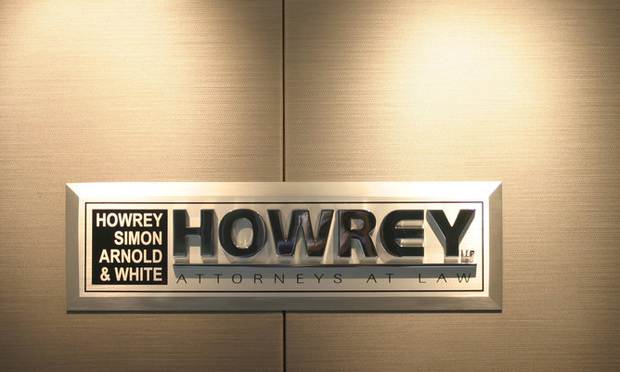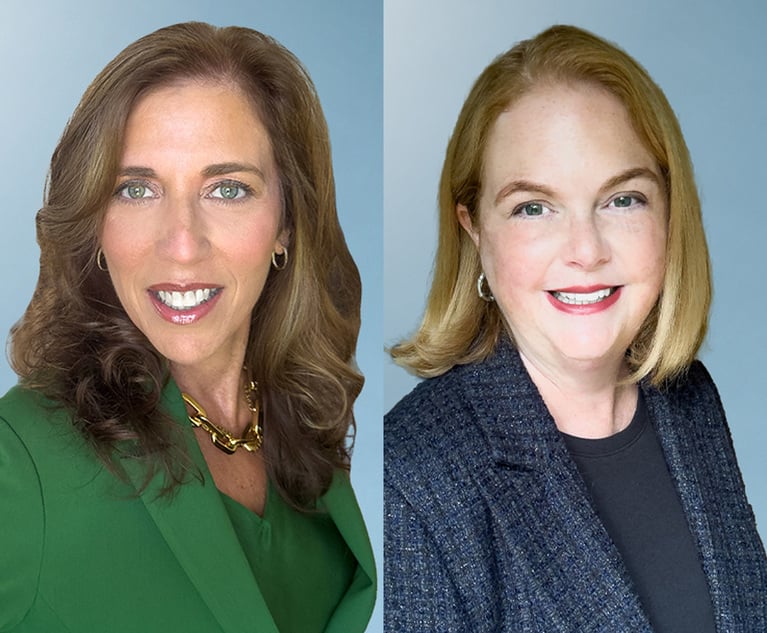Ninth Circuit Routes 'Unfinished Business' Question in Howrey Bankruptcy to DC Court of Appeals
The Ninth Circuit asked if partners who leave a dissolving firm have a duty to account for profits earned post-departure on matters subject to hourly billing under D.C. law.
February 27, 2018 at 01:59 PM
2 minute read

The U.S. Court of Appeals for the Ninth Circuit has asked an appellate court in the District of Columbia to weigh in on whether D.C. law allows estates of dissolved law firms to pursue legal claims related to unfinished client matters that partners take with them to new firms.
The Ninth Circuit on Tuesday certified three separate questions to the District of Columbia Court of Appeals in the bankruptcy of defunct intellectual property and litigation powerhouse Howrey. The move echoes a similar tack the Ninth Circuit took in the Heller Ehrman bankruptcy, where the federal appellate court asked the California Supreme Court to consider questions about whether so-called “unfinished business” claims are legitimate under California law. The California Supreme Court held arguments in the Heller case in December, but has yet to rule.
Jones Day has taken the lead in fighting unfinished business claims in both the Heller and Howrey bankruptcies on behalf of separate coalitions of large law firms who scooped up partners in the wake of those dissolutions. Jones Day partner Shay Dvoretzky, who argued the Heller case at the California Supreme Court, didn't immediately respond to a message seeking comment Tuesday morning.
Diamond McCarthy's Christopher Sullivan, who represents the trustee in both the Howrey and Heller bankruptcies, said that he was “very pleased” the Ninth Circuit's questions for the D.C. Court of Appeals took forms similar to what the trustee asked for at oral argument in the case.
In Tuesday's order, the Ninth Circuit asked if partners who leave a dissolving firm have a duty to account for profits earned post-departure on matters subject to hourly billing under D.C. law. If that is the case, the court asked if a dissolved firm in Howrey's position can collect from a new firm that benefits from the hourly work under an unjust enrichment theory. Finally, the Ninth Circuit asked what interest, if any, a dissolved law firm has in profits on hourly matters that were in progress at the time of dissolution that partners take with them to new firms under D.C. law.
The D.C. Court of Appeals can now decide whether or not to take up the Ninth Circuit's request to review the case.
This content has been archived. It is available through our partners, LexisNexis® and Bloomberg Law.
To view this content, please continue to their sites.
Not a Lexis Subscriber?
Subscribe Now
Not a Bloomberg Law Subscriber?
Subscribe Now
NOT FOR REPRINT
© 2025 ALM Global, LLC, All Rights Reserved. Request academic re-use from www.copyright.com. All other uses, submit a request to [email protected]. For more information visit Asset & Logo Licensing.
You Might Like
View All
Once the LA Fires Are Extinguished, Expect the Litigation to Unfold for Years
5 minute read

Faegre Drinker Adds Three Former Federal Prosecutors From Greenberg Traurig
4 minute readTrending Stories
- 1How Some Elite Law Firms Are Growing Equity Partner Ranks Faster Than Others
- 2Fried Frank Partner Leaves for Paul Hastings to Start Tech Transactions Practice
- 3Stradley Ronon Welcomes Insurance Team From Mintz
- 4Weil Adds Acting Director of SEC Enforcement, Continuing Government Hiring Streak
- 5Monday Newspaper
Who Got The Work
J. Brugh Lower of Gibbons has entered an appearance for industrial equipment supplier Devco Corporation in a pending trademark infringement lawsuit. The suit, accusing the defendant of selling knock-off Graco products, was filed Dec. 18 in New Jersey District Court by Rivkin Radler on behalf of Graco Inc. and Graco Minnesota. The case, assigned to U.S. District Judge Zahid N. Quraishi, is 3:24-cv-11294, Graco Inc. et al v. Devco Corporation.
Who Got The Work
Rebecca Maller-Stein and Kent A. Yalowitz of Arnold & Porter Kaye Scholer have entered their appearances for Hanaco Venture Capital and its executives, Lior Prosor and David Frankel, in a pending securities lawsuit. The action, filed on Dec. 24 in New York Southern District Court by Zell, Aron & Co. on behalf of Goldeneye Advisors, accuses the defendants of negligently and fraudulently managing the plaintiff's $1 million investment. The case, assigned to U.S. District Judge Vernon S. Broderick, is 1:24-cv-09918, Goldeneye Advisors, LLC v. Hanaco Venture Capital, Ltd. et al.
Who Got The Work
Attorneys from A&O Shearman has stepped in as defense counsel for Toronto-Dominion Bank and other defendants in a pending securities class action. The suit, filed Dec. 11 in New York Southern District Court by Bleichmar Fonti & Auld, accuses the defendants of concealing the bank's 'pervasive' deficiencies in regards to its compliance with the Bank Secrecy Act and the quality of its anti-money laundering controls. The case, assigned to U.S. District Judge Arun Subramanian, is 1:24-cv-09445, Gonzalez v. The Toronto-Dominion Bank et al.
Who Got The Work
Crown Castle International, a Pennsylvania company providing shared communications infrastructure, has turned to Luke D. Wolf of Gordon Rees Scully Mansukhani to fend off a pending breach-of-contract lawsuit. The court action, filed Nov. 25 in Michigan Eastern District Court by Hooper Hathaway PC on behalf of The Town Residences LLC, accuses Crown Castle of failing to transfer approximately $30,000 in utility payments from T-Mobile in breach of a roof-top lease and assignment agreement. The case, assigned to U.S. District Judge Susan K. Declercq, is 2:24-cv-13131, The Town Residences LLC v. T-Mobile US, Inc. et al.
Who Got The Work
Wilfred P. Coronato and Daniel M. Schwartz of McCarter & English have stepped in as defense counsel to Electrolux Home Products Inc. in a pending product liability lawsuit. The court action, filed Nov. 26 in New York Eastern District Court by Poulos Lopiccolo PC and Nagel Rice LLP on behalf of David Stern, alleges that the defendant's refrigerators’ drawers and shelving repeatedly break and fall apart within months after purchase. The case, assigned to U.S. District Judge Joan M. Azrack, is 2:24-cv-08204, Stern v. Electrolux Home Products, Inc.
Featured Firms
Law Offices of Gary Martin Hays & Associates, P.C.
(470) 294-1674
Law Offices of Mark E. Salomone
(857) 444-6468
Smith & Hassler
(713) 739-1250







